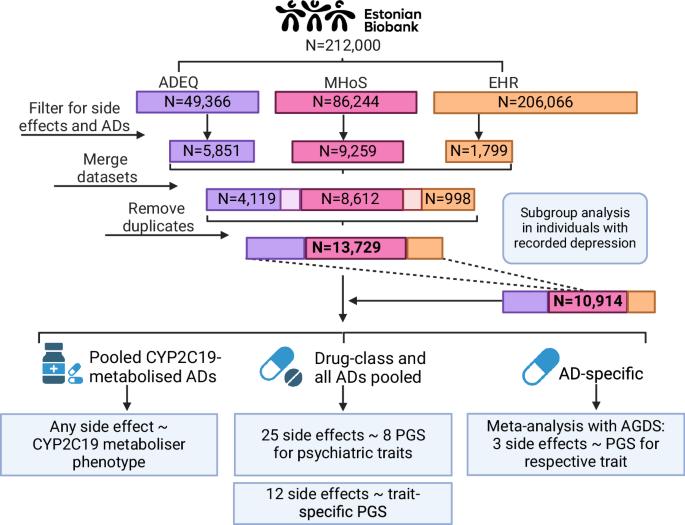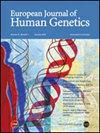Genetic influences on antidepressant side effects: a CYP2C19 gene variation and polygenic risk study in the Estonian Biobank
IF 4.6
2区 生物学
Q2 BIOCHEMISTRY & MOLECULAR BIOLOGY
引用次数: 0
Abstract
Antidepressant side effects are prevalent, leading to significant treatment discontinuity among patients. A deeper understanding of the underlying mechanisms could help identify individuals at risk of side effects and improve treatment outcomes.We aim to investigate the role of genetic variation in CYP2C19 and polygenic scores (PGS) for psychiatric and side effect-related phenotypes in experiencing antidepressant side effects.We pooled Estonian Biobank data from the Mental Health online Survey (N = 86,244), the Adverse Drug Events Questionnaire (N = 49,366) and from unstructured electronic health records using natural language processing (N = 206,066) covering 25 common side effects. The results were meta-analysed with previously published results from the Australian Genetics of Depression Study. Among 13,729 antidepressant users, 52.0% reported side effects. In a subgroup of 9,563 individuals taking antidepressants metabolised by CYP2C19, poor metabolisers had 49% higher odds of reporting a side effect (OR = 1.49, 95%CI = 1.09–2.04), while ultrarapid metabolisers had 17% lower odds (OR = 0.83, 95%CI = 0.70–0.99) compared to normal metabolisers. PGSs for schizophrenia and depression showed the most associations with overall and specific side effects. PGSs for higher body mass index (BMI), anxiety, and systolic blood pressure were associated with respective side effects among any antidepressant and selective serotonin reuptake inhibitor (SSRI) users. Meta-analysis confirmed robust evidence linking a higher BMI PGS and weight gain across nine antidepressants and moderate evidence linking PGS for headache with headache from sertraline. Our findings underscore the role of genetic factors in experiencing antidepressant side effects and have potential implications for personalised medicine approaches to improve antidepressant treatment outcomes.

抗抑郁药副作用的遗传影响:爱沙尼亚生物银行CYP2C19基因变异和多基因风险研究
抗抑郁药的副作用很普遍,导致患者的治疗明显中断。对潜在机制的深入了解可以帮助识别有副作用风险的个体并改善治疗结果。我们的目的是研究CYP2C19基因变异和多基因评分(PGS)在经历抗抑郁药副作用的精神和副作用相关表型中的作用。我们汇总了爱沙尼亚生物银行的数据,这些数据来自心理健康在线调查(N = 86,244)、药物不良事件问卷(N = 49,366)和使用自然语言处理的非结构化电子健康记录(N = 206,066),涵盖了25种常见的副作用。研究结果与先前发表的澳大利亚抑郁症遗传学研究结果进行了荟萃分析。在13,729名抗抑郁药使用者中,52.0%报告了副作用。在一个由9563名服用CYP2C19代谢药物的个体组成的亚组中,代谢不良者报告副作用的几率比正常代谢者高49% (OR = 1.49, 95%CI = 1.09-2.04),而超快速代谢者报告副作用的几率比正常代谢者低17% (OR = 0.83, 95%CI = 0.70-0.99)。精神分裂症和抑郁症的pgs显示出与总体和特定副作用的最大关联。在任何抗抑郁药和选择性血清素再摄取抑制剂(SSRI)使用者中,高体重指数(BMI)、焦虑和收缩压的pgs与各自的副作用相关。荟萃分析证实了强有力的证据表明,9种抗抑郁药物的高BMI PGS与体重增加有关,中度证据表明头痛的PGS与舍曲林的头痛有关。我们的研究结果强调了遗传因素在抗抑郁药物副作用中的作用,并对改善抗抑郁药物治疗结果的个性化药物方法具有潜在的意义。
本文章由计算机程序翻译,如有差异,请以英文原文为准。
求助全文
约1分钟内获得全文
求助全文
来源期刊

European Journal of Human Genetics
生物-生化与分子生物学
CiteScore
9.90
自引率
5.80%
发文量
216
审稿时长
2 months
期刊介绍:
The European Journal of Human Genetics is the official journal of the European Society of Human Genetics, publishing high-quality, original research papers, short reports and reviews in the rapidly expanding field of human genetics and genomics. It covers molecular, clinical and cytogenetics, interfacing between advanced biomedical research and the clinician, and bridging the great diversity of facilities, resources and viewpoints in the genetics community.
Key areas include:
-Monogenic and multifactorial disorders
-Development and malformation
-Hereditary cancer
-Medical Genomics
-Gene mapping and functional studies
-Genotype-phenotype correlations
-Genetic variation and genome diversity
-Statistical and computational genetics
-Bioinformatics
-Advances in diagnostics
-Therapy and prevention
-Animal models
-Genetic services
-Community genetics
 求助内容:
求助内容: 应助结果提醒方式:
应助结果提醒方式:


